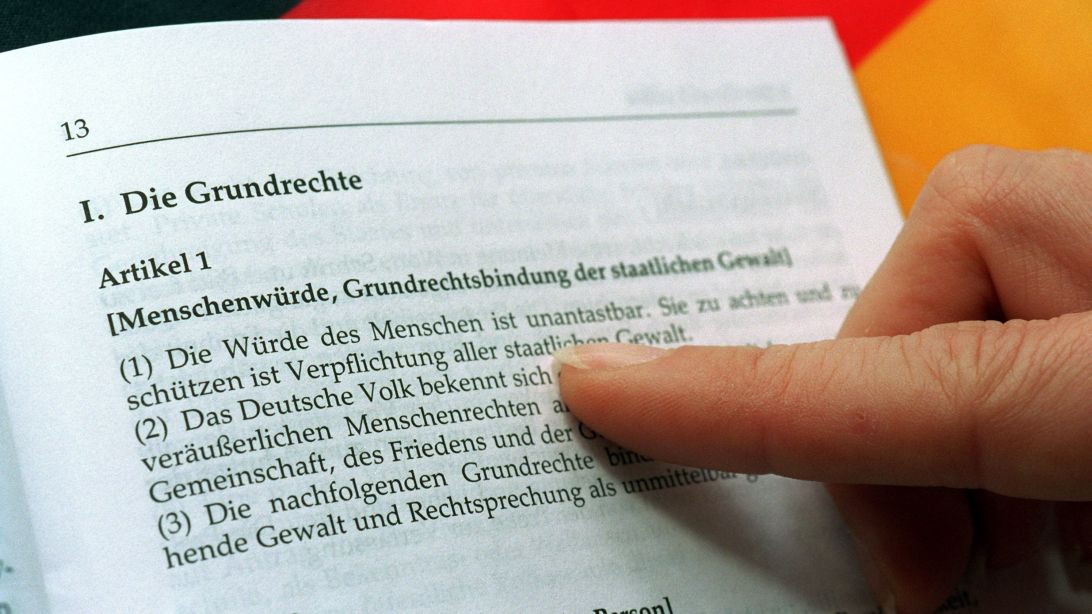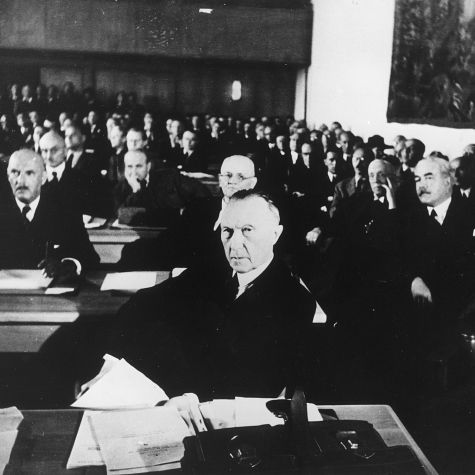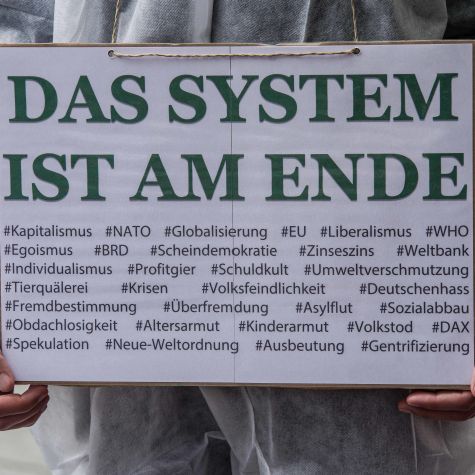Protecting the constitution

Can we take it for granted today that everyone can express their opinion freely? That everyone can practise their religion without fear of repression? That peaceful demonstrations are possible? That everyone can speak openly about their individual sexual orientation and live accordingly? That elections are democratic? That there is information provided by an independent press? That everyone can practise a profession of their choice? That people are really free?
In many countries of the world, this is unfortunately not at all the case. There is an increasing impression that the number of truly free democratic societies in the world is declining.
It is all the more important to stand up for our pluralistic form of society, to respect it, to support it with state structures and to protect it where anti-constitutional efforts are about to attack or undermine it.
Protection of the constitution: reminder and mission
In Germany the Weimar Republic, our first democracy, was despised and attacked by the right and left fringe of the political spectrum, and it was ultimately destroyed because of its own defencelessness. This paved the way for the National Socialist tyranny, whose protagonists then established an inhuman system of government, committed unprecedented crimes and started a war that claimed millions of lives. This war also brought about the division of Germany. Even after the war, millions of Germans in the former German Democratic Republic (GDR) were denied democracy for many more decades.
The Parliamentary Council’s work in 1948/49 was therefore shaped by the idea that the Basic Law of the Federal Republic of Germany should not only be a counter-model to the Constitution of the Weimar Republic but also constitute a reminder based on the lessons learnt from history. Neither war nor tyranny were to emanate from German soil ever again. This is why our Basic Law is the constitution of a democratic state governed by the rule of law that strives to have peaceful relations with its European and non-European neighbours.
In addition, the Basic Law encourages and requires commitment from the state as well as from civil society. A free society depends on its citizens’ general readiness to stand up for democracy and human dignity. But the state and its institutions also have to ensure the existence of and protect a free society wherever its key values, which are guaranteed by the constitution, are called into question.
The Federal Constitutional Court describes the political system of the Federal Republic of Germany as a democracy determined and able to defend itself (“militant democracy”).
Legal framework
The decision to create, by means of the Basic Law, a vigilant and militant democracy based on specific values and to implement a comprehensive system to protect the constitution also manifests itself in the respective legislation of the Federation and of the federal states.
Pursuant to Section 3 of the Federal Act on the Protection of the Constitution (BVerfSchG), the Bundesamt für Verfassungsschutz (literally: Federal Office for the Protection of the Constitution; BfV), together with the domestic intelligence services of the federal states, collects and analyses information about

(1) efforts
- directed against the free democratic basic order or
- directed against the existence and security of the Federation or of one of its federal states or
- threatening the foreign interests of the Federal Republic of Germany by actual, or preparations for intended, use of force or
- directed against the concept of international understanding (Art. 9 (2) Basic Law / GG), in particular against the peaceful relations between nations,
(2) intelligence activities on behalf of a foreign power (counter-intelligence).
Moreover, BfV contributes to the security of classified material, personnel security and counter-sabotage as provided for in Section 3 (2) BVerfSchG.
The BVerfSchG specifies the core duties of the domestic intelligence services of the federal states. The duties defined in the BVerfSchG may not be limited by the respective legislation of the federal states.
Based on these specifications, however, the federal states themselves are in charge of regulating the duties, working methods and powers of their own domestic intelligence services. For instance, over and above the catalogue of duties laid down in the BVerfSchG, the domestic intelligence services of some federal states support political decision-makers, the police as well as other state bodies and public authorities by providing information about threats emanating from organised crime, for example.
Free democratic basic order
One of the main duties of the domestic intelligence services of the Federation and the federal states is the monitoring of efforts directed against the free democratic basic order. The free democratic basic order does not refer to the constitution, i.e. the Basic Law, as a whole but rather to the unalterable key values and principles constituting the core of our democratic system.
Acts on the protection of the constitution of the Federation and of the federal states
But what exactly constitutes this unalterable core concept of our community? The acts on the protection of the constitution of the Federation and of the federal states elaborate on the term “free democratic basic order”, in accordance with consistent past decisions of the Federal Constitutional Court and expert literature.

According to Section 4 (2) BVerfSchG, the fundamental values and principles include
- the right of the people to exercise the state authority it has been vested with through elections and votes and through specific legislative, executive and judicial organs and to choose the body representing the people in general, direct, free, equal and secret elections,
- the commitment of the legislature to the constitutional order and the commitment of the executive and judiciary to law and justice,
- the right to form and exercise a parliamentary opposition,
- the replaceability of the government and its accountability to parliament,
- the independence of the courts,
- the exclusion of any despotic and arbitrary rule, and
- the human rights as laid down in the Basic Law.
Largely identical definitions can be found in the acts on the protection of the constitution of the federal states.
Decision of the Federal Constitutional Court in 2017 (“NPD ban”)
In its decision about the banning procedure regarding the Nationaldemokratische Partei Deutschlands (NPD, National-Democratic Party of Germany) in 2017, the Federal Constitutional Court defines the term “free democratic basic order” more precisely. From the court’s point of view, the key principles are human dignity, democracy and the rule of law.
An excerpt of the decision (BVerfGE 144, 20-367 Ls. 3) reads:
“The concept of the free democratic basic order within the meaning of Art. 21 (2) GG only covers those central fundamental principles which are absolutely indispensable for the free constitutional state.
a) The free democratic basic order is rooted primarily in human dignity (Art. 1 (1) GG). The guarantee of human dignity covers in particular the safeguarding of personal individuality, identity and integrity and elementary equality before the law.
b) Furthermore, the principle of democracy is a constitutive element of the free democratic basic order. The possibility of equal participation by all citizens in the process of forming the political will as well as accountability to the people for the exercise of state authority (Art. 20 (1) GG) are indispensable for a democratic system.
c) Finally, the concept of the free democratic basic order is further determined by the principle that organs of the state be bound by the law (Art. 20 (3) GG) – a principle which is rooted in the principle of the rule of law, and by independent courts’ oversight in that regard. At the same time, protection of the freedom of individuals requires that the use of physical force is reserved for the organs of the state which are bound by the law and subject to judicial oversight.”
In its above decision, the Federal Constitutional Court points out that the free democratic basic order may not be equated with the constitutional order as a whole but rather focuses on a small number of central fundamental principles which are absolutely indispensable for the free constitutional state.
Radicalism vs. extremism
In a lively democratic discourse, there is also room for radical views. As a matter of fact, it is legitimate for people to say, for example, that they consider democracy to be the wrong form of government or that they do not regard capitalism as the right economic and social system, nor the social market economy as the right economic and sociopolitical model. The Basic Law only refers to the obligation to abide by the law, but not to a loyalty to values. An exception are judges, soldiers and civil servants. They are obliged to have opinions and convictions that are in line with the constitution.
Radical views of critical citizens are no reason for the German domestic intelligence services to take action. They are covered by freedom of expression, are a sign of political participation and are therefore protected by the free democratic basic order.
Radical views become relevant to the German domestic intelligence services whenever they turn into extremist efforts, i.e. when individuals behave in a way that is bound to harm or abolish the state’s basic structure. When individuals or groups act against the free democratic basic order, or even plan to commit attacks because of extremist convictions, the most important duty of the German domestic intelligence services is to – overtly or covertly – gather relevant information and to analyse it in order to pass it on to the competent bodies and to enable effective threat prevention.
The German domestic intelligence services already take action before responsibility falls to the police. Thus, they act as an effective early warning system to protect our democratic community from harm.




